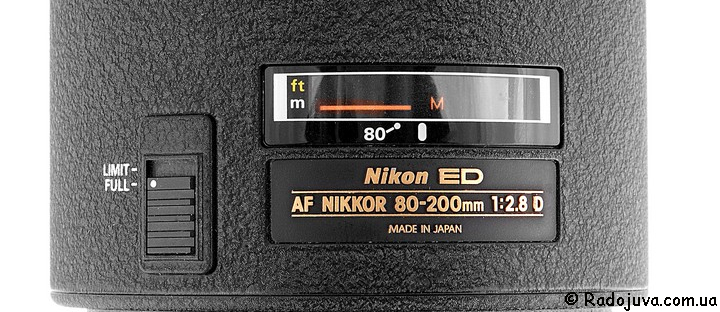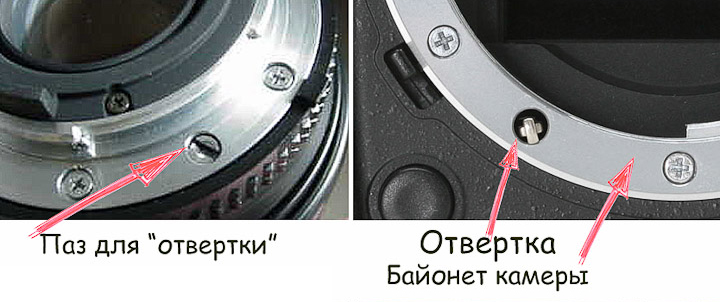On the network you can find different information about the speed of automatic focusing lenses Nikon Nikkor type 'AF' with different cameras. In this article, you can find some thoughts about this.
Lenses for Nikon Cameras type 'AF' do not have a built-in focusing motor and, during automatic focusing, the focusing motor located in the camera itself is engaged in moving the lenses to focus on focus. This motor is most often referred to as a 'screwdriver' by Nikon users, as the transmission from camera to lens really resembles a screwdriver.
A 'screwdriver' rotates and, through a special 'receiver' on the lens, transmits a torque to the internal mechanism of the lens, which moves the lenses, producing focus. If a disassemble the camera, the built-in focusing motor will turn out to be very small in size, sometimes you might even wonder how it can move huge and heavy lenses on large lenses.
So, there is an opinion that the 'cooler' the camera, the faster it focuses. So, you can find information that TOP cameras Nikon D1, D2 series, D3, D4 have noticeably faster focusing with 'AF' type lenses than other cameras.
Experiment 1. I had the opportunity to test two cameras of different levels - Nikon D80 (advanced mid-range amateur camera) and D700 (camera upper class) with lens Nikon ED AF Nikkor 80-200mm 1: 2.8D MKII.
More interesting videos can be viewed at my youtube channel.
Experiment 2. If we compare the focusing time with the lens Nikon ED AF Nikkor 80-200mm 1: 2.8D MKII on the old film camera Nikon AF N8008s and at the Central Control Commission Nikon D700, then the difference will be palpable:
This topic is quite interesting, so write your observations about the speed of focusing with different cameras in the comments.
Thank you for attention. Arkady Shapoval.




Switching from D5100 to D700, the focusing speed with screwdriver lenses increased tenfold))))
Arkady, as always, well done! Thumbs up!
Is there a screwdriver on the D5100 ??? )))
Dozens? And it should have been to infinity, because by definition, there is no trace of a screwdriver in 5100.
Artyom most likely simply means that the speed of manual focusing with screwdriver lenses on the d5100 has changed many times compared to the automatic focusing on the d700.
then for sure))
No infinity! It is impossible to divide by zero! )
Hello, please! 5 years of higher mathematics down the drain? you can’t divide it by zero!
What was the video filmed for? )))
When switching to d7000 with d80, it also seemed to me that 7000 focuses faster
Nikon 1 AW1
For a number of reasons, I had to change the D300 to the D7100. The speed is almost the same, but the 7100 focuses better in poor conditions.
No wonder. The focus modules are different. 7100 the most magnificent device :)
On the "piece of paper" they are not the same. There are a couple of major differences.
Using the example of Nikon D200 and Nikon D50, I can say that the focusing speed is identical, BUT the waiting time for mdf in d200 is much less, the d50 reaches mdf more and then continues on its way in another direction.
I can also add from experience that the D50 has a more tenacious AF, which I do not know what it is connected with, possibly due to the fact that only 5 AF points are possible for other reasons. In the dark, the d50 also focuses much more confidently (without backlight af).
A little off topic, but I can also add that the matrix in the d50 is significantly less noisy. With the d50, you can safely shoot at ISO 1600, but with the d200 you are already afraid of ISO 800. I used to shoot the d3100 and I can say with confidence that the d50 is at a noise level of d3100, but the color preservation is much higher. In the D3100, even in a ditch and even with the suppression of color noise, everything remains exactly at ISO 1600 spots. In D50 there are no spots, the picture, as with ISO 200, is only more grainy.
I did not compare with standard models. But I compared the D90 with 50 1.8D with the Nikon n8008 and the Nikon F80. Well, NAK ... my personal opinion is a bit ahead of the F80. Sam D 90 is on a par with n90. By the way, Arkady do a comparative test with your film camera. Do you have one? On the photo in the reviews often appears. Your opinion is interesting.
This is an idea.
My example:
https://www.youtube.com/watch?v=i2IKfIIrFWk&feature=youtu.be
Arkady is right as always !!!
The steeper the carcass, the faster the autofocus.
Verified!
Thanks for the interesting article Arkady!
what a hopeless gloom.
Lynx, do not smear;)
there is nothing to spread, do not flood.
I threw up from the music in the video somewhere in 30 seconds and did not watch it ...
Strong, however!
I had enough for 15 seconds and installation.
Lynx is about you https://www.youtube.com/watch?v=mJ-nm-o07zQ
ban_set
It seems to me, the secret is in the more advanced processing processor and in the rest of the sensors. The "top-end" the camera, the better (faster) its filling works.
no.
I compared the focusing speed of the F100 and D7000, and so - according to the sensations of the F100 the motor turns the lens much faster, the motor power even seems excessive. True, I did not test it on heavy lenses like 80-200, only on 85mm 1.8D and fifty dollars.
Many thanks to Arkady for his blog and the great useful work he does.
Does the battery capacity and charge level affect the focus speed? And is it readable by comparison?
It’s difficult for me to answer this question exactly. Basically, cameras rotate the engine equally with different battery levels.
You can also try to compare the focus speed on a single camera, but with different en-el3e and en-el4a batteries. He didn’t take measurements for lack of the latter
The difference in focusing speed in old and new cameras, most likely, is that the screwdriver motors of more advanced cameras have several speeds, the camera knows from the firmware file not only data on distortion, vignetting, but also the features of the reduction gear of each lens ( most likely only his relatives, Nikon's) and chooses the optimal speed. Too high is also not good, it needs a high holding torque, that is, to brake at the right moment in the right place. Therefore, we switched to an ultrasonic drive, it allows you to work in a very wide range of speeds - from 0,2 to 80 rpm (taken from the CANON website)
I have d50 and d70s, so the second one turns the screwdriver significantly faster, or rather, the feeling is that with greater force, as if the motor is standing there more powerful. in practice, this is noticeable on televisions, e.g. 75-300, on a regular half-axis, the difference is almost not noticeable.
D700 (higher price range camera) ???
Where is D4 to old man D700?)
D4 is top-end, for which it is indicated in the article. Name / share cameras as you like.
She can upper class, but not the upper price range, and has never been in it
Fixed This meant that there is nothing to start a fire for nothing.
And will there be Chinese cameras?
No, handmade items are no longer visible :)
Why was that review needed at all?
It happens..
The review is needed so that Chinese crooks could not bomb anymore. Now in a Google request for this camera it will be clearly written that this is Shit and not a camera. And it is worth a lot. Thanks to Rukosha and Arkady for this review!
According to my feelings, the F90s rotates faster than the D600, but it misses a lot more often. True, the D600 is not mine, they did not shoot much.
Arkady, is the difference in the speed and focusing accuracy of “screwdriver” lenses and those with a built-in motor significant? And if so, how much?
If the lens works well, then I did not find a big difference between af, AF-s lenses. But here the focusing algorithms with motor and non-motor in some situations are very different.
Is it possible in more detail? About algorithms and in what situations. I think that can help many decide when choosing a lens. Indeed, price is often the determining factor.
Nobody will tell you about algorithms, since this is closed source code. This is known only by experience.
If the determining factor is price, then build on the price.
From personal experience - the 80-200 / 2.8D lens of the third version was used on three cameras D700, D3s and Df, the tracking focus mode is most in demand, and not as in examples from MDF to infinity. Subjectively, D3c is faster and more accurate than everyone else, 700 is a little worse, Df is from another planet, AF-C is very slow-witted there. With 27-40 / 2.8G, I did not notice much difference in focusing speed.
Here we discuss the purely speed of motors of different cameras, and not their real tenacity in the focusing operation. 27-40 / 2.8G theoretically there should be no difference, since there is a motor built into the lens.
24-70 / 2,8G
I have not yet found a good AF lens for me, for this twist I elements, not the motor.
do you shoot reports? If so, then I do not believe you :))
As for the autofocus speed of the “screwdriver” ones, I can note a noticeable difference between the Nikon D600 and the Nikon N65 with the Nikkor 70-210 F / 4.0 lens. the N65 is slower ...
video class!
I tried to shoot fifty kopecks on different cameras. Version D which. From fresh, Chinese =)
Everything seemed fine on its D200, but it buzzes terribly with its mechanics.
On the F100, it feels like it (the lens) will just be torn to shreds after a while. Very strong autofocus camera, IMHO. AF-C rarely stutters and focuses well in poor conditions. I don’t know to which class to classify “weaving”.
Focusing on the D700 is faster than on the D200, for example. Perhaps a really more powerful motor. As is the case with the D7000.
With D3, comments are superfluous, but there is no such brutal treatment of the inside of the lens as in the F100 =)
80-200 of the second version, "older" cameras rotate faster and more accurately.
To summarize, in newer cameras and a higher class one feels better aphthofocus performance in general (tracking speed) + motor power.
The old cameras seem to lack the strength to twist at the same speed.
PS On youtube there are many tests of focus speed with a closed cover for different cameras.
Arkady thanks for your work!
I confirm on the Nikkor 80-200 / 2,8 II, the camera decides.
If it is abstract in sensations to evaluate the focusing speed in some units, then
F65 - 100 units
D7000 - 80 units
D750 - 65 units
those. The D750 focuses faster on 35 percent than on the F65.
50 points on Nikon D80 vs Nikon D300 - the difference in focusing speed can be noticed without any problems. I shoot reports, so I paid attention to this issue for a long time ... but here the question is more likely not a more expensive or cheaper camera, but in the years of production - older cameras rotate lenses more slowly. so D80 vs D90 clearly illustrate this question
Tell me what focuses faster? a screwdriver or a built-in motor in the lens on screwdriver cameras for reportage shooting? because the article didn’t answer this question, it’s just that I have a dilemma to take a camera for a screwdriver so as to save on obt for example d90 or take Nikon 5200 and a lens with aft focus
It all depends on the specific lens models; there is no general answer to your question. It is believed that lenses with an integrated motor are preferable.
I recently switched from Tamron 17-50 motor, to Tamron 17-50 screwdriver. The focusing speed doubled. Interested in this question, which lens will be faster to put the battery in the camera, and whether there will be any difference in the battery. In fact, have not yet tested it.